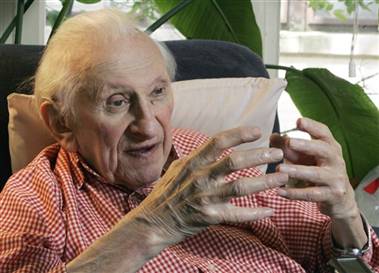Pulitzer Prize Winning Author Terkel Dies Aged 96
 Terkel, popularly known as Studs Terkel, who won the Pulitzer prize for his oral history 'The Good War' in which he chronicled World War II, died aged 96 at his Chicago home. He was also famous for his narratives of US history through personal stories from a cross-section of society, in books like 'Working' and ' Division Street : America' . According to his son, Terkel led an eventful, tempestuously satisfying life, entertaining listeners for four decades on his Chicago based radio show.
Terkel, popularly known as Studs Terkel, who won the Pulitzer prize for his oral history 'The Good War' in which he chronicled World War II, died aged 96 at his Chicago home. He was also famous for his narratives of US history through personal stories from a cross-section of society, in books like 'Working' and ' Division Street : America' . According to his son, Terkel led an eventful, tempestuously satisfying life, entertaining listeners for four decades on his Chicago based radio show.
Born to Russian Jewish parents in the Bronx, his father was a tailor and his mother a seamstress, they later moved to Chicago , Illinois when Terkel was eight, where they ran a rooming house. It is here that young Terkel would meet the activists and workers, who became his mentors, profoundly influencing and shaping his views of the world. A native New Yorker, yet, as he recalls in his 2007 memoir 'Tough and Go', he embraced Chicago, together with all its 'carbuncles and warts'. An old rebel who never mellowed nor retired, he was a cigar and martini man, white-haired and elegantly rumpled in his trademark red-checkered shirts.
Though, Terkel came to be best known for his oral histories, his prodigious career spanned acting, writing, broadcasting, and in 1970 he came out with his book Hard Times: An Oral History of the Great Depression, wherein he assembled recollections from across the socio-economic spectrum of prison inmates to the rich and wealthy. In 1992, he put together an oral history of race relations called 'Race: How Blacks and Whites Think and Feel About The American Obsession', including his 1995 'Coming of Age' recollections of men and women aged 70 and above.
A graduate of the University of Chicago, Terkel studied philosophy and even picked up a law degree. But, instead of opting for law, he briefly joined the civil service, leaving it to work on radio interview shows. Alton Miller, a friend of Terkel's for 20-years and associate dean of the School of Media Arts at Columbia College , Chicago says Terkel had hoped he would live to see Barack Obama elected as President of the USA. And, Obama, himself a Chicago man and an ardent admirer of Terkel, who he called a Chicago institution and national treasure, paying tribute to the author, in his Friday night statement voiced what many felt: 'His writings, broadcasts, and interviews shed light on what it meant to be an American in the 20th century, He will be deeply missed by all who knew him, all who loved him, and all whose lives were enriched by the American stories he told.'